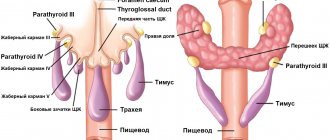How the body normalizes T4 levels
T4 levels are regulated by two glands: the thyroid gland and the pituitary gland in the brain. The pituitary gland is responsible for the production of thyroid-stimulating hormone (TSH), which controls the level of the thyroid hormone T4. The pituitary gland regulates TSH production according to how much T4 it detects in the blood. For example, if the pituitary gland detects low levels of T4 in the blood, it produces and releases more TSH into the blood. If T4 levels rise, it stops producing TSH. This process ensures that T4 levels remain within normal limits.
Normal T4 level
There are two types of T4: bound and free. Bound T4 attaches to proteins that prevent it from entering body tissues. Free T4 does not attach to proteins, so it freely enters the body tissues that use it.
The total T4 test detects levels of both bound and free T4, while the free T4 test identifies only free T4 levels.
A TSH test is prescribed to evaluate thyroid function. Combining a free T4 test with a TSH test gives the most accurate picture of how your thyroid is functioning.
In adults, normal total T4 levels range from 5-12 mcg per deciliter (mcg/dL) of blood. Normal free T4 levels range from 0.8 to 1.8 nanograms per deciliter (ng/dL) of blood.
T4 levels also vary between trimesters of pregnancy. A 2011 study describes normal ranges for pregnant women as 0.95–1.53 ng/dL in the first trimester and 0.87–1.45 ng/dL in the second trimester.
Complexes with this research
Thyroid gland Extended study of hormonal levels of the thyroid gland RUB 4,080 Composition
Assessment of thyroid function Analysis of thyroid function disorders (hyper- and hypothyroidism) RUB 1,590 Composition
Expanded anti-aging diagnostics in postmenopause Expanded monitoring of age-related changes during postmenopause RUB 29,230 Composition
IN OTHER COMPLEXES
- Thyroid screening RUB 2,950
- Women's check-up No. 1 RUB 19,290
- Female hormones. Menopause RUR 2,220
- Anti-aging diagnostics in postmenopause RUB 12,630
- Men's check-up No. 1 RUB 18,570
Reasons for changes in T4 hormone levels
Sometimes a person's T4 hormone levels may change and fall outside the normal range. Depending on the direction of the change, this can lead to hypothyroidism or hyperthyroidism.
Hypothyroidism
is the medical term for an underactive thyroid gland that does not produce enough hormones. Conversely, hyperthyroidism is a condition in which there is an overactive thyroid gland that produces too many hormones.
Changes in T4 hormone levels can be caused by several factors.
Causes of hypothyroidism
Hashimoto's disease
In this autoimmune condition, the immune system mistakenly attacks the thyroid gland. Ultimately, the thyroid gland is unable to produce enough thyroid hormones. Hashimoto's disease is the most common cause of hypothyroidism.
Thyroiditis
Thyroiditis is inflammation of the thyroid gland. Thyroiditis can be caused by a viral or bacterial infection, an autoimmune disease, or pregnancy.
Previous thyroid treatment
Some treatments for hyperthyroidism and thyroid cancer may cause side effects or complications that lead to hypothyroidism. Examples of such treatments include surgery or radioactive iodine therapy.
Congenital hypothyroidism
This condition occurs when the thyroid gland does not function properly from birth. This can lead to problems with physical and mental growth, but early treatment can prevent these complications.
Causes of hyperthyroidism
Graves' disease
Graves' disease is an autoimmune condition in which the immune system mistakenly attacks the thyroid gland, causing it to produce too much thyroid hormone.
Thyroid nodules
Some of the nodules contain thyroid tissue, which contributes to the overproduction of thyroid hormone. Most thyroid nodules are benign, but some may be cancerous.
Excessive iodine intake
If a person takes extra iodine in dietary supplements or medications, the thyroid gland begins to produce too much hormone.
T4 hormone is higher than normal, what does this mean?
The T4 hormone is less active than T3, but its action is very similar to it. Thus, during analyzes with any deviations, they show an increase and decrease almost simultaneously, with the exception of some temporary cases. TSH and T4 can be elevated for various reasons, but most of them are associated with problematic functioning of the adrenal glands.
TSH is elevated, T4 is elevated: symptoms
You can understand that a person is beginning to have problems with hormonal levels by preliminary symptoms that do not appear immediately. In the initial stages, they are easiest to distinguish, which makes it possible to identify the problem in advance and begin prompt treatment. The main symptoms include the following:
- Increased heart rate;
- Fatigue, which manifests itself chronically and is not associated with too high stress on the body;
- Increased sweating, noticeably higher than before;
- Rapid irritability, which affects a person’s behavior;
- There may be a sensation of interruptions in the heart area;
- Gradual and stable weight loss, provided that the diet and physical activity do not change;
- Slight hand tremors.
TSH decreased, T4 normal or increased
When TSH is low and T4 is high, these symptoms can also appear, since T4 is their main causative agent.
T4 hormone is higher than normal, what does this mean?
When considering the case when free T4 is higher than normal and what this means, it should be taken into account that the effect of the hormone on the body increases. When TSH is elevated and free T4 is elevated, an increased breakdown of organic substances occurs in the body. This leads to the release of excess energy. Not only energy from incoming food is used, but also from existing fat deposits. The released energy enters various parts of the body, in which natural processes are enhanced. Physiologically natural reactions acquire an abnormal level. Thus, excitability develops into irritability. The heartbeat increases, tachycardia appears, which creates a great danger with increased stress on the body. Due to the excessive reaction speed of the nerves, tremors and bouncing of the fingers occur.
When TSH is low and T4 is high, weight loss occurs due to fat burning. But this weight loss cannot be called beneficial for the body. This occurs due to disorders of the nervous system and heart function, which becomes a dangerous condition. Also, there is no limitation here, which leads to exhaustion of the body. Muscle and bone tissue begins to weaken, and the patient experiences constant fatigue. The risk of injury increases greatly.
TSH and free T4 are elevated: reasons
Diseases do not appear out of nowhere. If TSH and T4 are elevated, a specialist can explain what this means after the tests. Fluctuations in hormones occur under the influence of external and internal factors, and for each of them there is a number of reasons why the increase occurs. The following factors can lead to an increase in T4:
- Subacute and acute thyroiditis;
- Thyroid dysfunction, which occurs in women after childbirth;
- Large excess weight, which puts people with clinical obesity at risk;
- Elevated levels of immunoglobulin G in myeloma;
- Choriocarcinoma;
- Action of the human immunodeficiency virus;
- Chronic liver diseases;
- Glomerulonephritis, which appears with nephrotic syndrome;
- Toxic diffuse goiter;
- Porphyria;
- The use of synthetic hormonal drugs that are analogues of thyroid hormones, such as methadone, cordarone, insulin, levodopa, iodine-containing X-ray contrast agents, and so on.
Often the patient himself does not know what leads to an increase in T4 levels. There is not always one reason and the matter may lie in several areas at once.
How to lower hormones, TSH and T4 elevated
First of all, experts begin to look for what caused the increase. If you manage to diagnose the disease at an early stage, then it is much easier to recover from it. If you destroy the source of the disease, the hormones will return to normal on their own. If a patient has a tumor, then to solve the problem, experts often recommend removing the part of the organ on which it is located. If surgery is not performed, there remains a high risk of more serious problems.
In later stages of illness, treatment is more complex, not to mention the fact that in some cases, complete recovery cannot be achieved. When a patient receives tests where TSH is normal and T4 is elevated, the attending physician understands what this means and what to do about it. But when the diagnosis is made at a late stage of the disease, it may already be too late to treat it. All this is connected not only with complications after operations and other treatments, but also with the possibilities of medicine. In some cases, chronic hypothyroidism develops, which a person will have to put up with throughout his life.
In this form of the disease, as well as in its milder manifestations, one of the best treatment options is taking medications. Most often these are hormonal drugs that will help reduce T4 and other problematic factors. To avoid complications in a mild form of the disease and not to expose the patient to the risk of surgery, medications are prescribed after passing the appropriate tests. Here you need to take into account the body’s reaction to the components that make up the medicine, and also do not forget about the dosage so as not to exceed the amount.
Nutrition also becomes an additional factor influencing the decrease in hormonal levels. It will not be possible to achieve strong effects here, but it is quite possible to alleviate the situation with the right diet. Experts recommend eating more raw vegetables, seafood, legumes, grains and lean, but protein-rich foods. Everything should be rational and you shouldn’t consume too much of anything. In any case, an individual treatment plan is drawn up for each patient, thanks to which it is possible to overcome the symptoms and causes of the disease in order to return the hormone level to normal.
Symptoms
Symptoms of abnormal T4 levels depend on whether the thyroid gland produces too little T4 hormone or too much.
Symptoms of hypothyroidism
In hypothyroidism, the thyroid gland produces too little T4 hormone and metabolism slows down. This may be accompanied by the following symptoms:
- slow heartbeat
- tiredness or weariness
- slow thinking
- depression
- weight gain
- constipation
- joint and muscle pain
- dry skin
- cold intolerance
Symptoms of hyperthyroidism
With hyperthyroidism, the thyroid gland produces too much T4 and metabolism speeds up. This may lead to the following symptoms:
- cardiopalmus
- increased risk of heart rhythm problems
- restlessness or irritability
- difficulty sleeping
- weight loss
- muscle weakness
- frequent bowel movements or diarrhea
- sweating and heat intolerance
Laboratory analysis
Thyroid diseases have the same symptoms as other physical diseases. Therefore, doctors usually cannot diagnose abnormal T4 levels based on symptoms alone. Instead, they may use laboratory methods to determine thyroid function by measuring the level of thyroid hormones in the blood:
- thyroid stimulating hormone (TSH) or thyrotropin
- free T4 or thyroxine
- free T3 or triiodothyronine, another type of thyroid hormone
Normal thyroid hormone levels fall within a wide range. Thus, it can sometimes be difficult to determine whether a person's thyroid hormone levels are low or high. The combination of the above tests can give the doctor a clear idea of how a person's thyroid gland is functioning.
Treatment
Treatment for abnormal T4 levels depends on the level.
Treatment of hypothyroidism
Most people who develop this disease are over 60 years of age. levothyroxine is prescribed to treat hypothyroidism.
to increase levels of the natural thyroid hormone thyroxine.
When a person first starts taking levothyroxine, they are required to have blood tests every 6-8 weeks. They allow the doctor to monitor T4 levels to adjust the dosage if necessary. Once the doctor determines the correct dosage, repeat blood tests are performed every 6-12 months. Hypothyroidism can usually be treated with the right medications.
Treatment of hyperthyroidism
There are several different treatments for hyperthyroidism. The doctor will prescribe the best option based on the individual’s individual needs.
Treatment methods include:
- Medicines
called thionamides stop the thyroid gland from producing too much hormone. - Radioiodine therapy
: This type of radiation therapy destroys cells in the thyroid gland, lowering the levels of hormones that the thyroid gland produces. - Surgery
: As a last resort, your doctor may recommend surgery to remove part or all of the thyroid gland. If part of the gland is removed, a person's T4 levels may return to normal. If the entire gland is removed, the person will have to take thyroid hormone medications for the rest of their life.
Thyroid hormones
Interpretation of urine tests in adults.
table of norms and reasons for deviations from the norm. The thyroid group includes thyroxine (T4) and triiodothyronine (T3). T4 includes 4 iodine atoms and the amino acid tyrosine in its molecule and is a precursor to T3. The transformation occurs in the tissues of the body. It is integrated into nuclear structures and stimulates the formation of the most important enzymes involved in metabolism.
Hormone balance is extremely important in childhood, as well as for women during pregnancy. Thyroid hormones regulate the development of all organ systems of the child. T3 is involved in:
- maintaining homeostasis;
- metabolism of proteins, fats, carbohydrates;
- process of hematopoiesis;
- development and coordination of the work of bodies.
Abnormalities in T3 and T4 levels in the blood cause hyperthyroidism or hypothyroidism. Metabolic diseases, homeostasis disorders, pathologies of organs and their systems, and menstrual irregularities in women occur. Secretory insufficiency of the thyroid gland can be caused by the following factors:
- violation of TSH synthesis;
- deficiency or excess of iodine;
- autoimmune diseases of the gland;
- thyroid pathologies: gland tumors of various origins, endemic goiter, inflammatory diseases;
- radioactive damage;
- uncontrolled treatment with hormonal drugs;
- menopause in women, women's diseases.
Women are more susceptible to thyroid dysfunction. If thyrotoxicosis or hypothyroidism occurs, a specialist will prescribe a blood test to determine the level of thyroid hormones. The analysis allows you to determine the level of free and total T3 and T4. General T3 and T4 are not associated with transport proteins and are the active form. The free form rate is 0.03%. Analysis for total T3 and T4 shows the concentration of the hormone of all forms. Below we present the standards for the content of various components and decipher them. Test results depend on the person's gender and age.
Normal T4 in women, men and children (Table 1)
| Female gender | ||
| T4 general | ||
| Age | nmol/l | mcg/dl |
| 16 years | 76,4 – 187,9 | 5,94 – 14,6 |
| 5 – 10 years | 76,9 – 176,3 | 5,98 – 13,7 |
| 10 – 18 years | 75,9 – 168,5 | 5,90 – 13,1 |
| 20 - 39 years old | 76,0 – 164,7 | 5,91 – 12,8 |
| From 40 years old | 63,3 – 155,7 | 4,92 – 12,1 |
| Pregnancy | 94,2 – 200,7 | 7,32 – 15,6 |
| T4 free | ||
| Age | pmol/l | ng/dl |
| 5 – 14 years | 7 – 16 | 0,5 – 1,2 |
| 14 – 20 years | 8 – 21 | 0,6 – 1,6 |
| From 20 years old | 9 – 25 | 0,7 – 2,0 |
| Pregnancy | 7 – 24 | 0,5 – 1,9 |
| Gender: male | ||
| Age | Total T4, nmol/l | Free T4, nmol/l |
| First month of life | 112 – 243 | 16 – 33 |
| 6 months – 1 year | 92 –189 | 14 – 23 |
| 15 years | 89 – 173 | 13 – 23 |
| 5 – 10 years | 71 – 145 | 12 – 22 |
| 10 – 15 years | 64 –149 | 12 – 22 |
| 15 – 60 years | 60 – 140 | 10 – 23 |
| From 60 years old | 65 – 129 | 10 – 18 |
Normal T3 in women, men and children (Table 2)
| Female gender | ||
| Age | Total T3, nmol/l | Free T3, pmol/l |
| 13 years | 1,10 – 3,30 | 3,50 – 8,30 |
| 4 – 6 years | 2,30 – 4,00 | 4,60 – 9,80 |
| 7 – 10 years | 2,20 – 3,10 | 4,00 – 17,20 |
| 11 – 16 years old | 2,00 – 3,10 | 3,40 – 6,00 |
| 16 – 20 years | 1,22 – 3,22 | 3,20 – 6,50 |
| 20 – 50 years | 1,07 – 3,13 | 3,10 – 6,80 |
| From 50 years old | 0,61 – 2,78 | 2,60 – 5,70 |
| Gender: male | ||
| Age | Total T3, nmol/l | Free T3, pmol/l |
| 13 years | 1,93 – 3,90 | 2,90 – 7,50 |
| 4 – 6 years | 1,80 – 3,60 | 2,50 – 9,20 |
| 7 – 10 years | 1,90 – 3,30 | 4,00 – 22,90 |
| 11 – 16 years old | 2,20 – 3,40 | 3,50 – 7,70 |
| 16 – 20 years | 2,10 – 4,10 | 1,23 – 3,23 |
| 20 – 50 years | 1,80 – 4,20 | 1,08 – 3,14 |
| From 50 years old | 1,80 – 4,10 | 0,62 – 2,79 |
Testing shows that the rate of free hormones in children is higher. This is due to the active processes of growth and development of their body.
Forecast
A person with abnormal T4 levels will likely need this form of treatment to bring the level back within the normal range. Some people need to take medications for several years or perhaps for life.
A person also needs regular blood tests to monitor their T4 levels. With proper treatment, most people can normalize their T4 levels and continue to live relatively normal lives.
Related article: How thyroid function affects hair loss.
Lack of the hormone thyroxine
blood pressure decreases
Causes
autoimmune thyroiditis
- damaged pituitary gland, hypothalamus;
- insufficient consumption of iodine-containing foods;
- lack of protein food components in the diet;
- improper rest and work schedule;
- work activities related to the production of chemicals;
- the influence of certain hormonal agents and groups of drugs;
- consumption of alcoholic beverages;
- drug addiction;
- traumatic brain injuries;
- sudden weight loss or obesity;
- intoxication of the body.
A lack of thyroxine occurs after childbirth, so it is important to check hormone levels immediately after childbirth.
Symptoms
- dry skin and mucous membranes;
- weight gain;
- decreased performance, concentration;
- cold intolerance;
- menstrual irregularities;
- hair loss (alopecia);
- constipation;
- fragility of the nail plate;
- swelling;
- disturbances in the functioning of the gastrointestinal tract;
- lethargy;
- decreased temperature and blood pressure;
- heart rhythm disturbances.
Treatment
- The hormone is replenished using the synthetic hormone “L-thyroxine”. The drug is quickly absorbed without causing complications or adverse reactions. You need to take it once a day, but strictly at a certain time of the day. Before a dosage is prescribed, the doctor conducts an in-depth study of the level of thyroxine content and synthesis. It is necessary to strictly adhere to the prescribed dosage and conduct control examinations 4 times a year, because an excess of the drug leads to the development of hyperthyroidism.
- Strict adherence to a diet that is developed at the individual level.
- It is possible to use homeopathic medicines and herbal medicine.
Hormonal therapy may not be used at all. But only in cases where the level of the hormone thyroxine is slightly reduced or in cases of iodine deficiency etiology of the origin of the disease.
- Take iodine purchased from a pharmacy. To do this, take 100 ml of high-quality vodka, add 4-5 drops of iodine to it and shake well. Take 2 times a day, 1 tbsp. l. Consume 50-60 minutes before meals, with water. The duration of treatment is 7 days, after which you need to take a week break.
- The most delicious way to treat. Buy seaweed (kelp) - 250 grams. Add 50 ml of dry wine and a little iodized salt. Eat salad every day after eating once a day.
- Fig fruits contain many useful substances that normalize the functionality of the thyroid gland. The daily norm of figs is 3 pieces. First, pour boiling water over the fruits and leave overnight. In the morning on an empty stomach, eat one fruit, wash it down with the liquid in which the figs were infused. Then eat one fruit before lunch and dinner.
- Grind 150 grams of walnuts, add a glass of honey, 50 grams of garlic. You can also add some anise fruit. Take a tablespoon before meals three times a day.
- Buy feijoa berries, combine them with honey and eat them throughout the day.
Complications
- Hypothyroid coma. Its first signs: loss of consciousness, severe shortness of breath, slowing of pulsation, excessive drop in body temperature, swelling, intermittency of breathing. The result is death.
- Heart failure, stroke, myocardial infarction, ischemic heart disease, atherosclerosis and other pathologies of the circulatory system, heart, and brain.
- Infertility, deterioration of libido, potency.
- During pregnancy, late toxicosis, miscarriages, premature birth, and anemia develop. During childbirth, severe bleeding may occur, the baby may be born with abnormal abnormalities and even dead.










